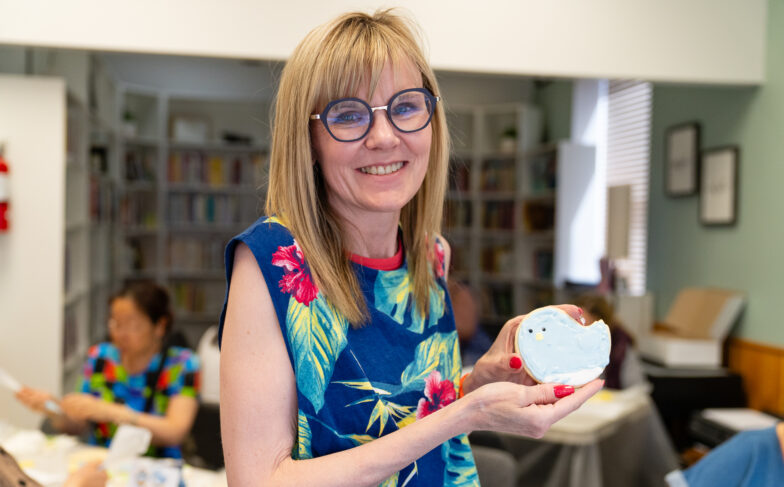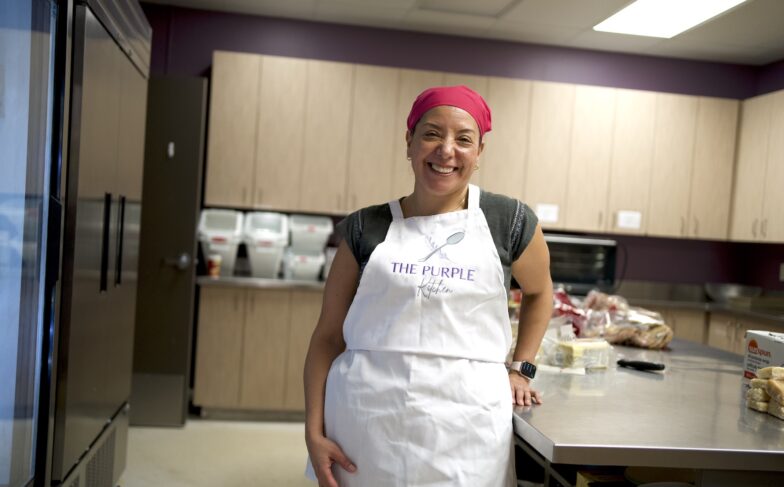You might have to look closely to find it, but tucked away on the underside of 37-year-old Mappy’s forearm is a small—but mighty—tattoo. The message, Stay Strong, represents the mother of three’s challenging journey and is a forever reminder of the mantra that keeps her moving forward.
“I just want to look at it when I’m doubting myself,” she said.
Mappy also has a second tattoo that’s easier to spot, but one she’s more than ready to never see again. A large and cursive Kevin, made with a homemade gun and written across her chest, casts a dark shadow of a very different time in Mappy’s life. It’s a time she left behind long ago, yet the indelible ink has remained.
“Right after (getting) this, not even a couple of weeks after, I slowly started losing everything,” Mappy recalled. “I lost my kids, I lost my place, I lost my car. And then I was homeless for six years. That’s all I think about when I look at it.”
Mappy grew up in Winnipeg and fell under the grip of addiction in her teens and early 20s. Shortly after Kevin appeared, her young daughter and son were removed from her care, and for the next six years, she fought every day to survive.
“I was really, really roughing it. I was just panhandling and collecting beer cans at recycling bins,” Mappy remembered. “I’ve fallen asleep outside in the winter and had people wake me up to get me inside so I didn’t get frostbite … or worse.”
When Mappy, still homeless and addicted, became pregnant with her third child, she knew it was time to make a change. Determined to hold onto and raise her baby, she left Manitoba for Cranbrook, British Columbia.
“I just needed to remove myself from the people that I was hanging out with, the people that were giving (drugs) to me constantly and stuff like that,” she said. “Once I was removed from that, I was able to get better.”
Mappy’s daughter was born in BC as she gained sobriety and worked hard to stay strong and achieve her goals. She participated in parents’ groups, took regular drug tests, and communicated with Child and Family Services to secure time with her kids back home. Three years ago, when she was ready, Mappy and her two-year-old daughter returned to Winnipeg.
Mappy began visits with her two older children, and she enrolled in CDI College to complete the Addictions and Community Services Worker program. She started her career at Resource Assistance for Youth on Sherbrook Street, helping others find strength in struggle like she experienced all those years ago.
So much changed for Mappy.
But Kevin endured.
“This is the last part of my past,” she said, running her fingers over the tattoo. “I just don’t want to have to look at it anymore or think about it anymore … and then the weight is lifted off my shoulders.”
With that in mind, a colleague at RaY told Mappy about a way she could possibly lift that ink from her skin, and that weight from her shoulders: at Mother Ink.
“I think all of us make mistakes—and we don’t wear those mistakes on our face and hands.”
Mother Ink is the passion project of Winnipegger Della Steinke, a bold and colourful force who started doing tattoo removal about 10 years ago while working with inmates reintegrating into society at federal halfway houses.
“I was already working with ex-gang members and things like that, and I had a couple of guys who came in. They’d just gotten out of prison, and they didn’t want to leave the yard because they were too scared of getting jumped—either by their old gang or a rival gang,” Della recalled. “So I asked the bosses if I could take them after hours to the shop where I was doing tattoo removal, and they said yeah.”
Word spread quickly of the life-changing service Della was offering: removing the last vestiges of a past many had worked hard to move forward from, but because of their tattoos, was still holding them back.
“I think all of us make mistakes—and we don’t wear those mistakes on our face and hands. It really does hold people back from starting on a new path. It affects so many different parts of their lives,” said Della, adding before her clients have their ink removed, they’re often turned down for housing, educational opportunities, and jobs.
“Sometimes, by the time the tattoo is gone, they’ve gotten a job and they’ve gotten their first-ever apartment on their own. That’s huge for them. I’ve had guys who are six foot five actually tear up … they get very emotional.
“It’s not just about removing that tattoo—it’s about removing that part of their life. It’s the last thing that they need to change before that part of their life is dead and gone.”
With the help of United Way Winnipeg donors through the Spence Neighbourhood Association, Della was able to open up her own parlour at 3-505 Sargant Avenue last year.

“It’s not just about removing that tattoo—it’s about removing that part of their life. It’s the last thing that they need to change before that part of their life is dead and gone.”
Mother Ink now services more than 150 clients in-house and another 100 in jails and prisons—where Della starts the tattoo removal process on ex-gang members so people can be tattoo free when they are released.
With Statistics Canada estimating it costs nearly $120,000 to house one inmate for one year in Canada, Della explains the cost of removing just one person’s unwanted gang tattoos is small compared to the heavy price of leaving the mark as-is.
“It’s so much safer. Then there’s not as much of a risk of people getting jumped or getting back into their gang,” she said. “We’re saving taxpayers for every one person that doesn’t go back to jail.”
Spence Neighbourhood Association executive director Michele Wikkerink said once she learned of Mother Ink’s unique approach, she knew immediately she wanted SNA to get involved.
Wikkerink said active gang recruitment in Winnipeg is increasing, with newcomer youth and other vulnerable kids at critical risk of turning down a dangerous path. And once a young person is connected to the lifestyle, it can be extremely difficult to escape.
“It’s really quite staggering in its scope,” she explained. “It starts with giving the kids something. Families that don’t have a lot of money … it’s very enticing. They can be sucked down this road, and sometimes it’s 20 years down the road. It really is a dead-end journey.”
Wikkerink said it’s a big reason why she believes we should do everything we can to help Winnipeggers avoid the lifestyle for good, including supporting the work of Mother Ink.
“It’s helping people move forward in their lives with this one very symbolic and physical way of doing that: removing tattoos for people that are no longer expressive of who they are. It’s very tangible and hands on,” she said. “It’s really critical to do this work.”

For Mappy, she’s about eight treatments into her Kevin removal process, with possibly a dozen or more to go. She sees Della once every couple of weeks at Mother Ink.
“She’s just an amazing, lovely person. I just love going there,” Mappy said. “She always makes you feel good.”
Mappy’s proud of how much she’s grown and healed along her journey—and she’s excited about continuing to feel comfortable in her own skin long into the future.
“I’ve learned that I need to not overwhelm myself with things, stick to my rules and boundaries. I just have a lot of rules and stuff for my life now,” she said.
“Oh, and never get names tattooed on you.”





